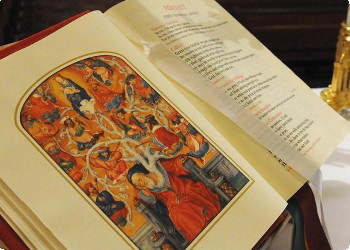I am not strong enough to dig and I am ashamed to beg
7 NOVEMBER (Lk 16,1-8)
Joseph, the son of Jacob is an example of good administration. With his knowledge, wisdom and expertise he ensures that Pharaoh becomes the owner of all his kingdom. Every territory is bought in exchange for grain and delivered to the King of Egypt.
When all the money in Egypt and Canaan was spent, all the Egyptians came to Joseph, pleading, “Give us food or we shall perish under your eyes; for our money is gone.” “Since your money is gone,” replied Joseph, “give me your livestock, and I will sell you bread in return for your livestock.” So they brought their livestock to Joseph, and he sold them food in return for their horses, their flocks of sheep and herds of cattle, and their donkeys. Thus he got them through that year with bread in exchange for all their livestock. When that year ended, they came to him in the following one and said: “We cannot hide from my lord that, with our money spent and our livestock made over to my lord, there is nothing left to put at my lord’s disposal except our bodies and our farm land. Why should we and our land perish before your very eyes? Take us and our land in exchange for food, and we will become Pharaoh’s slaves and our land his property; only give us seed, that we may survive and not perish, and that our land may not turn into a waste.” Thus Joseph acquired all the farm land of Egypt for Pharaoh, since with the famine too much for them to bear, every Egyptian sold his field; so the land passed over to Pharaoh, and the people were reduced to slavery, from one end of Egypt’s territory to the other. Only the priests’ lands Joseph did not take over. Since the priests had a fixed allowance from Pharaoh and lived off the allowance Pharaoh had granted them, they did not have to sell their land. Joseph told the people: “Now that I have acquired you and your land for Pharaoh, here is your seed for sowing the land. But when the harvest is in, you must give a fifth of it to Pharaoh, while you keep four-fifths as seed for your fields and as food for yourselves and your families (and as food for your children).” “You have saved our lives!” they answered. “We are grateful to my lord that we can be Pharaoh’s slaves.” Thus Joseph made it a law for the land in Egypt, which is still in force, that a fifth of its produce should go to Pharaoh. Only the land of the priests did not pass over to Pharaoh (Gen 47,15-26).
Jesus asks every one of his disciples to go beyond the very Joseph. he has to turn every good of the earth into blessed eternity. Even the smallestgood, even a loaf of bread must be turned into joy and happiness of Heaven. Every Christian must acquire this science, this wisdom and thisexpertise. From the infinitesimal good of the earth he must get a huge amount of immortal happiness. This is the one and only true administration of the goods of this world. The others are in disastrous, sinful, futile, foolish, unwise, inhuman, anti-human and of eternal death.
Then he also said to his disciples, “A rich man had a steward who was reported to him for squandering his property. He summoned him and said, ‘What is this I hear about you? Prepare a full account of your stewardship, because you can no longer be my steward.’ The steward said to himself, ‘What shall I do, now that my master is taking the position of steward away from me? I am not strong enough to dig and I am ashamed to beg. I know what I shall do so that, when I am removed from the stewardship, they may welcome me into their homes.’ He called in his master’s debtors one by one. To the first he said, ‘How much do you owe my master?’ He replied, ‘One hundred measures of olive oil.’ He said to him, ‘Here is your promissory note. Sit down and quickly write one for fifty.’ Then to another he said, ‘And you, how much do you owe?’ He replied, ‘One hundred kors of wheat.’ He said to him, ‘Here is your promissory note; write one for eighty.’ And the master commended that dishonest steward for acting prudently. “For the children of this world are more prudent in dealing with their own generation than are the children of light.
The shrewdness of the Christian must consist right in this: making himself with the goods not belonging to him, because they are all of God, a good eternal future. He must leave, abandon every good of this world at any time. There is no safety for anyone. Today we are. Tomorrow we are no longer. So why not prepare a holy eternal future for us? It is wisdom to use an ephemeral, momentary, instantaneous good to produce with it aneternal good that will always be ours. The gain is zero, of total loss if we use them only for this world. Instead, it is infinite, eternal if we use them to procure us the key that will allow us to enter Paradise. Wisdom obliges.
Virgin Mary, Mother of the Redemption, Angels and Saints teach us true wisdom.





